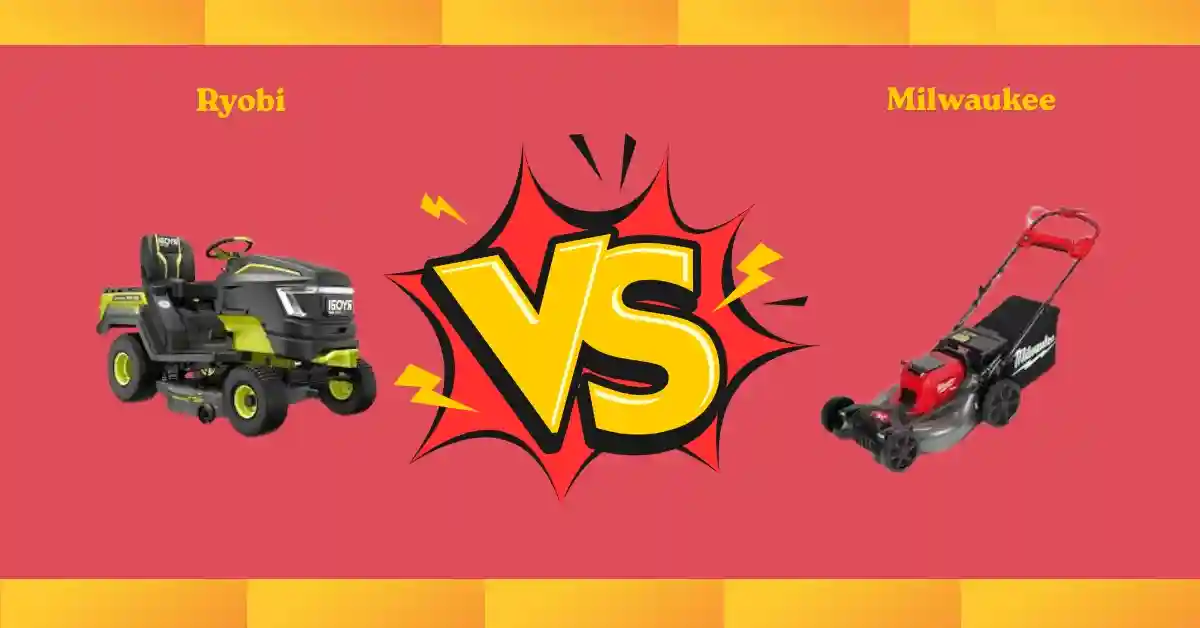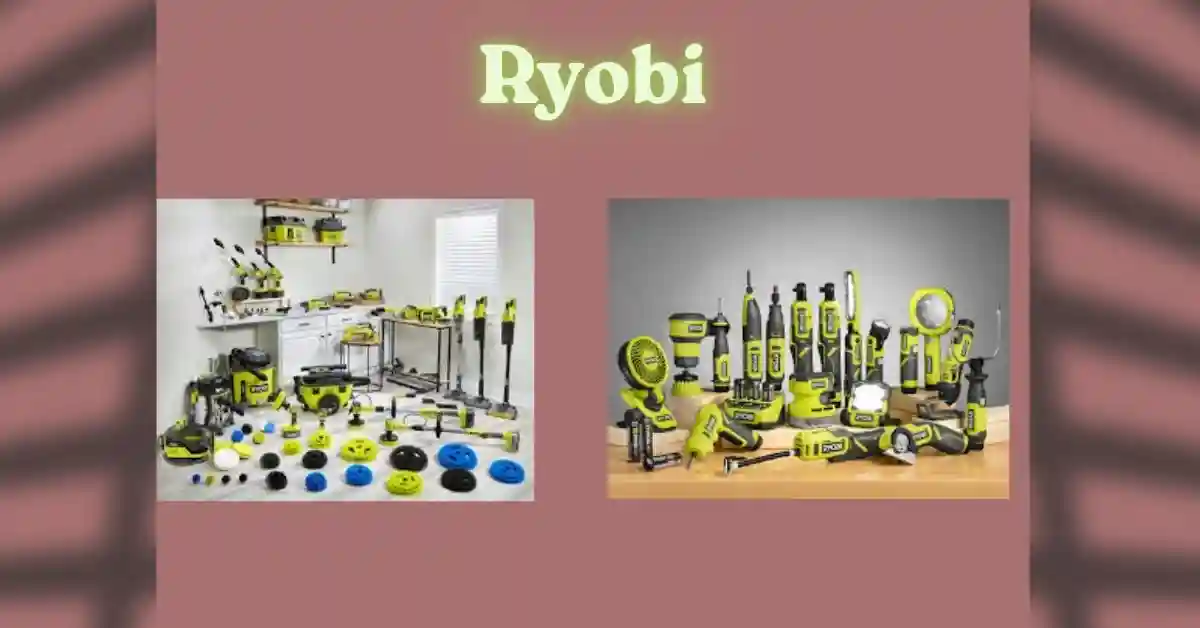Ryobi vs Milwaukee: Powerful Lessons I Learned Hands-On

When people ask me about Ryobi vs Milwaukee, I always say it depends on what you need most—budget-friendly tools for weekend projects or pro-grade gear built to last on tough jobs. I’ve used both in my own work, from fixing things around the house to helping friends on job sites, and each brand shines in its own way.
After years of testing, I can break down the real differences so you know which one fits your style best. Stick with me, and by the end you’ll know exactly where to put your money.
Ryobi
I’ve been using Ryobi tools for more than two years. In that time, I have tested drills, yard tools, and even a mower. What I like most is how simple they are to use. Ryobi makes my work easier without asking me to spend too much.

What I Like
When I think about Ryobi, a few things always stand out. Over the years, I’ve tried many brands. Ryobi feels different. It makes work simple and stress-free.
- Affordable but still solid – Ryobi tools give me good results without draining my budget. I like that I can save money and still get work done.
- Big product range – From lawn care to home repairs, Ryobi has tools for almost every job. I don’t need to switch between brands.
- One battery for many tools – The 18V and 40V battery systems are a lifesaver. I use the same battery for my drill, trimmer, and blower. It saves space and time.
- Easy to use – Ryobi tools are lighter and more comfortable than some bigger brands. I can work longer without feeling worn out.
- Reliable results – Ryobi may not be the strongest brand out there, but it always gets the job done. I know I can count on it for weekend jobs and yard work.
What Could Be Better
No brand is perfect, and Ryobi has a few areas to improve. None of these are big issues, but small changes would make things even better.
- Battery life for tough jobs – On heavy projects, I swap batteries faster than I’d like. A stronger option would be great.
- Not always pro-level – Ryobi works best for home use. For very tough jobs, some tools feel light compared to pro brands.
- Build materials – A few tools feel a bit too “plastic.” A sturdier touch would make them feel stronger.
- Different markets, different tools – Ryobi products vary by country. A more consistent line worldwide would help buyers know what to expect.
My Personal Experience
I’ve been using Ryobi tools for over two years. I own both yard tools and power tools. In that time, I’ve learned how the brand works in real life.

Design
The design is the first thing I noticed. The handles feel good in my hand. The tools are light but not weak. The bright green color stands out in my shed, so I never lose them. Ryobi feels made for real people, not just for the store shelf. That ease makes work less of a chore.
Performance
Ryobi’s performance has been better than I expected. My drill handles wood and metal with no issue. My mower cuts through grass with steady power. It may not be the fastest or the strongest, but it is reliable. I’ve used other brands that felt bulky or rough. Ryobi gives me balance—strong enough, yet easy to handle.
Build Quality
At first, I thought the light build might mean weak tools. But after two years, most of my Ryobi gear still works well. The tools are durable enough for home and garden tasks. They may not be heavy like pro tools, but they don’t break easily either. Ryobi feels like a trusted everyday car. It may not be a luxury brand, but it always starts and takes me where I need to go.
Milwaukee
I’ve been testing Milwaukee tools for years, and they always leave a strong impression. From their drills to storage systems, each product feels built with care. What stands out to me most is how they balance power with durability. These tools make tough jobs feel a lot easier and save me time on every project.

What I Like
I’ve been around tools for years, and Milwaukee has often been my go-to brand. Here are a few reasons why I keep coming back to it:
- Long-lasting batteries: Their M18 and M12 systems save me time. I don’t have to stop in the middle of a job to recharge often. That reliability makes even tough projects easier.
- Wide tool lineup: From drills to impact drivers and even storage systems, I can stay in the same ecosystem. It feels like everything works together, which is a big plus.
- Solid innovation: Tools like the Sawzall and PACKOUT storage show Milwaukee is not afraid to push the limits. They bring practical solutions that actually make work smoother.
- Professional-grade durability: I’ve dropped my Milwaukee tools more times than I care to admit, and they still keep running. That level of toughness gives me peace of mind.
- Comfortable design: Even after hours of use, the grip and balance feel right. It reduces fatigue, and that makes a difference on long days.
What Could Be Better
I’ve also noticed a few things that could improve. Nothing here is a deal-breaker, but being honest helps you set the right expectations.
- Price point: Milwaukee tools can be on the higher end. I see it as an investment, but a bit more affordability would make them accessible to more people.
- Weight of some tools: A few of their heavier drills and saws can get tiring over long sessions. Lighter builds without losing power would be a nice upgrade.
- Accessory availability: While the main tools are easy to find, sometimes specific attachments or accessories aren’t as widely stocked as I’d like. More local availability would help.
- Learning curve with new systems: Innovations like PACKOUT or MX FUEL are great, but they take some time (and money) to get into. A smoother entry point would be helpful for new users.
My Personal Experience
I’ve been using Milwaukee tools for over 2 years, both for personal projects and helping friends with home improvements. Over that time, I’ve learned what makes the brand stand out and where it can improve.

Design
The first thing I noticed about Milwaukee tools is their thoughtful design. The red-and-black look is iconic, but beyond that, the balance and ergonomics shine. Holding a Milwaukee drill feels natural — like it was made for my hand. The PACKOUT storage system also impressed me; it’s like having Lego blocks for grown-ups, stacking and locking with ease. It saves me clutter and keeps my garage organized.
Performance
Performance is where Milwaukee really earns my trust. Their drills power through wood and metal without stalling, and the impact drivers have helped me with projects I thought I couldn’t handle alone. I remember the first time I used a Milwaukee Sawzall — it cut through old pipes like a hot knife through butter. Compared to some cheaper brands I’ve tried, Milwaukee doesn’t just get the job done; it gets it done faster and smoother.
Build Quality
If tools could take a beating and still keep going, Milwaukee would be the poster child. I’ve dropped mine off ladders, left them in a damp garage overnight, and even loaned them out (which is usually the true test). They come back working just as strong. That durability means I don’t worry about babying my tools. While some models are heavier, that weight often signals the solid build and motor inside. For me, it’s a fair trade-off.
Details Comparison: Ryobi vs Milwaukee
I’ve been testing out both Ryobi and Milwaukee tools for a while, and the difference shows up in real use. Each brand has its own strengths, and both serve different types of users. Let’s look at them across key areas.
Battery Technology & Performance: Ryobi vs Milwaukee
Ryobi batteries are good for DIY and light tasks. Milwaukee batteries are built for tough, all-day work.
| Brand | Battery Strength | Battery Weakness |
| Ryobi | Affordable 18V/40V system | Shorter run-time under heavy load |
| Milwaukee | M12/M18 REDLITHIUM with long life | Higher cost per battery |
Rating: Ryobi 7.5/10 | Milwaukee 9.5/10
Build Quality & Durability: Ryobi vs Milwaukee
Ryobi tools are solid for home use but may wear faster. Milwaukee tools are rugged, built to survive job sites.
| Brand | Build Quality | Durability |
| Ryobi | Strong plastic housings | Good for light to medium work |
| Milwaukee | Heavy-duty cases, pro-grade | Excellent under daily stress |
Rating: Ryobi 7/10 | Milwaukee 9.5/10
Power Output: Torque, RPM, Speed: Ryobi vs Milwaukee
Ryobi offers enough power for common tasks. Milwaukee delivers more torque, speed, and control.
| Brand | Torque & Speed | Performance Gap |
| Ryobi | Works fine for home projects | Struggles in heavy-duty work |
| Milwaukee | High torque, fast RPM, consistent | Handles pro-grade jobs with ease |
Rating: Ryobi 7/10 | Milwaukee 9.5/10
Ergonomics & Weight / Size / Design: Ryobi vs Milwaukee
Ryobi tools are light and easy to handle. Milwaukee tools are a bit heavier but well-balanced.
| Brand | Comfort | Design |
| Ryobi | Lightweight, good for beginners | Bright green design, simple feel |
| Milwaukee | Balanced, ergonomic grips | Red-black design, pro-focused |
Rating: Ryobi 8/10 | Milwaukee 9/10
Ecosystem / Compatibility: Ryobi vs Milwaukee
Ryobi has one of the largest tool ecosystems for DIYers. Milwaukee has a pro-grade ecosystem that is smaller but powerful.
| Brand | Ecosystem Size | Compatibility |
| Ryobi | Over 280+ tools on ONE+ | Works with older 18V batteries |
| Milwaukee | M12, M18, MX FUEL systems | Advanced but costlier |
Rating: Ryobi 9/10 | Milwaukee 8.5/10
Innovations & Features: Ryobi vs Milwaukee
Ryobi focuses on accessibility. Milwaukee invests in new pro-grade innovations.
| Brand | Key Innovation | Limitation |
| Ryobi | Wide DIY range, budget tools | Few cutting-edge pro features |
| Milwaukee | FUEL brushless, ONE-KEY smart tools | Higher learning curve, cost |
Rating: Ryobi 7.5/10 | Milwaukee 9.5/10
Maintenance & Total Cost of Ownership: Ryobi vs Milwaukee
Ryobi tools are cheap to buy and replace. Milwaukee tools cost more upfront but last longer.
| Brand | Cost Factor | Long-Term Use |
| Ryobi | Affordable, easy to replace | Less lifespan in tough work |
| Milwaukee | Expensive but durable | Fewer replacements needed |
Rating: Ryobi 8/10 | Milwaukee 9/10
Suitability by Use Case: DIY vs Professional: Ryobi vs Milwaukee
Ryobi shines for DIY and casual work. Milwaukee is best for professionals.
| Brand | Best For | Weakness |
| Ryobi | Home projects, small jobs | Not built for daily pro use |
| Milwaukee | Contractors, heavy-duty | Too much for light users |
Rating: Ryobi 8.5/10 | Milwaukee 9.5/10
Warranty, Service & Support: Ryobi vs Milwaukee
Both offer good support, but Milwaukee adds stronger pro service.
| Brand | Warranty | Service |
| Ryobi | 3 years on most tools | Standard support |
| Milwaukee | 5 years on tools, 2 years on batteries | Wider pro service centers |
Rating: Ryobi 7.5/10 | Milwaukee 9/10
Price & Cost per Tool / Kit: Ryobi vs Milwaukee
Ryobi is budget-friendly. Milwaukee is costly but an investment.
| Brand | Price Range | Value |
| Ryobi | Affordable kits under $200 | Great for starters |
| Milwaukee | Premium kits $300+ | Strong ROI for pros |
Rating: Ryobi 9/10 | Milwaukee 8/10
Best Use Case: Ryobi vs Milwaukee
Ryobi is best for DIYers. Milwaukee is best for professionals.
| Brand | Ideal User | Reason |
| Ryobi | Homeowners, casual users | Affordable and easy to use |
| Milwaukee | Contractors, serious users | Powerful, durable, long-lasting |
Rating: Ryobi 8/10 | Milwaukee 9.5/10
Final Thoughts
Both Ryobi and Milwaukee have clear roles. Ryobi gives you value and choice if you are a DIYer or homeowner. Milwaukee is the go-to if you need pro-level strength and reliability every day. Think of Ryobi as a handy family car—affordable and reliable. Milwaukee is like a rugged truck—built to carry heavy loads without breaking down.
FAQs for Ryobi vs Milwaukee
Is Ryobi or Milwaukee better for beginners?
Ryobi is often better for beginners because it’s affordable and easy to use. Milwaukee is pricier but offers pro-level power and durability.
Which brand has longer battery life, Ryobi or Milwaukee?
Milwaukee batteries usually last longer and charge faster. Ryobi batteries are solid for home projects but not as strong for heavy tasks.
Are Ryobi tools compatible with Milwaukee batteries?
No, Ryobi and Milwaukee batteries are not cross-compatible. Each brand uses its own battery system, so you must stick with one platform.
Is Milwaukee worth the higher price compared to Ryobi?
Milwaukee is worth it for heavy work and long-term use. Ryobi is cheaper and fine for light tasks, making it good for DIY and casual users.
Which brand has a wider range of tools, Ryobi or Milwaukee?
Ryobi has a very large range for DIY and home use. Milwaukee offers fewer tools but focuses on pro-grade power, precision, and job site needs.
Read More: Ryobi P611 Review 2025: Shocking Performance Results Explained
